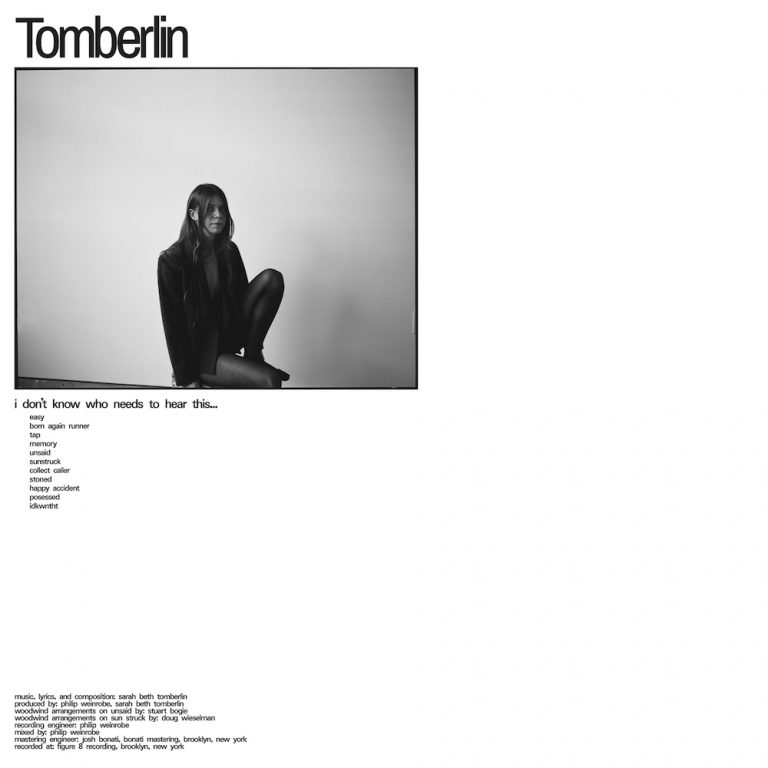The transition into adulthood is a time of confusion, disorientation and self-discovery for everyone. Growing up invested in the church where her father was pastor, Sarah Beth Tomberlin got an early start on these questions of self, as she found herself drifting from the Bible’s teachings and inquisitive about life outside God’s gaze. She poured that confusion into her debut album At Weddings, and has since then started making her way through the world as an openly queer and independent woman. In recent years she’s spent time in Louisville, Los Angeles and Brooklyn, New York, where she now calls home.
And it turns out: being in New York presents just as many questions about who you are as being in the church, if not more. i don’t know who needs to hear this…, Tomberlin’s second record, re-plants the songwriter in the east coast metropolis and shorn of her spiritual beliefs, but she’s still orbiting the same questions of place, identity and worth. Just like her debut, i don’t know who needs to hear this… finds her writing with such story-like clarity and honesty that it sometimes feels like she’s writing about herself as the protagonist in her work, rather than herself and her actual life. This only makes her music all the more personable and approachable, and gives it a warmth of a private conversation shared between singer and listener.
A lot of the self-discovery that Tomberlin details on the record comes through reflections of the other people she’s met in her recent travels and in her new home. This begins with the opener, “easy”, where a combination of muted drums and droplets of piano create a grey atmosphere in which a storm is brewing. What unfolds is a one-sided conversation between Tomberlin and a potential flame, their words rattling around in the singer’s head; “I wanna let you in / ‘cause I’m always eeeeasy” she intones, the final word sticking into her like a needle, deeper on each repetition. However, Tomberlin might not know exactly what she is, but she knows what she isn’t: “stop telling me I’m easy,” she concludes the song – the first sign of a stronger sense of self that crops up throughout i don’t know who needs to hear this….
This self-belief is tested and strengthened through the record as she comes into contact with all sorts of new people – not all of them nice. On “unsaid” she’s “trying to grow roots here” but can’t vibe with “the people and their parties where no one really talks”. Meanwhile, the disarmingly gorgeous “collect caller” finds her taking down a clout-chasing white boy living on his daddy’s dime. “happy accident” is by far the angriest we’ve heard Tomberlin, as a tempestuous guitar riff underlies her tale of being used by a hook-up: “walk five miles from my door / just to give you some more / do you just talk to me when you’re lonely and bored?” she snarls, before summoning her backbone and biting back “I won’t quit / I’m no accident.”
For every tough learning experience, there’s also a magical one. While “tap” begins with her feeling lobotomised by looking at too much social media, she’s soon up and out of the house, walking aimlessly. As Felix Walworth (aka Told Slant) and Kenny Wollesen tap out a couple of clever rhythms that entwine with her brisk guitar line, we trudge alongside her through the city, seeing the wonder of babies and buskers in the park, and we feel the weight lift off her; “I don’t have to be anything”, she realises before heading home for an evening of trash TV.
Meandering her way through her new existence also leads to deep connections and unlikely experiences. On “sunstruck” she’s “wired” from staying up all night talking to a special person, and on “stoned” she’s stumbling home from a party, high as hell in the glow of the sunrise. While we hear her growing into her womanhood in these happier moments – and equally in the unhealthy dalliances of “easy” and “happy accident” – the yang comes in a song like “possessed” where she quietly proclaims “I have nothing but a head full of doubt”.
Perhaps the spectre that is holding her back from fully self-actualising is her Christian upbringing, which may be firmly in the past but is certainly not buried. Sometimes her religious guilt pops up suddenly, like when she admits “always wondering if I’ll go to hell” in “tap”, or when she cries “I had forgiveness in my heart” in “stoned”. But the moment when she really reckons with that part of her history comes on shimmering second track “born again runner”, where she seems to be addressing her father as she remembers his sermons then expresses frustration at his inability to accept her: “you preach peace and patience but you don’t seem to have your own”. She caps it off with the pithy “I know I’m not Jesus but Jesus I’m trying to be enough,” which might not be the most mature response but undoubtedly displays a woman growing in agency.
Like all the best songwriters, Tomberlin doesn’t act like she has the answers to the big questions, but knows that simply by being inquisitive she will eventually figure out her own truths, and she’s passing that wisdom along with this record. She concludes the album by admitting “I don’t know who needs to hear this / sometimes it’s good to sing your feelings,” which is the sound of her submitting her songs to the universe to be found by whoever needs them. “I wish I was a hero with something beautiful to say,” she sighed on At Weddings – with this record she displays the courage and compassion to be exactly that.


